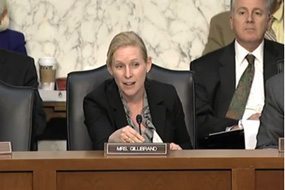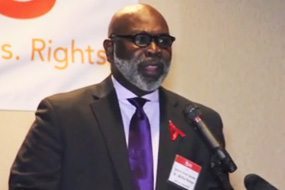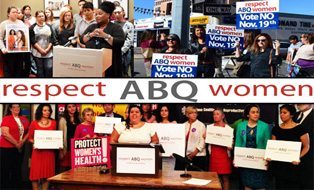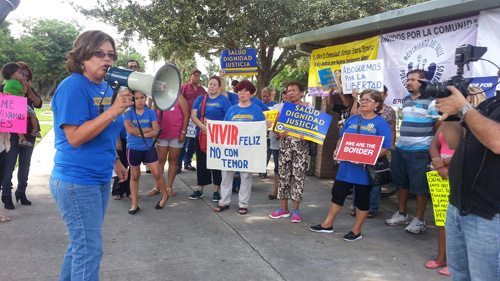The Top Pro-Choice Heroes of 2013
2013 not only saw a number of pro-choice successes but also countless hard-working activists and allies who, against tremendous odds, put in time and energy to advance reproductive rights and health and ensure the safety of women and girls of all backgrounds.

2013 not only saw a number of pro-choice successes but also countless hard-working activists and allies who, against tremendous odds, put in time and energy to advance reproductive rights and health and ensure the safety of women and girls of all backgrounds. We salute these heroes for all that they do each and every day to make certain that women and their families have the resources they need to live happy, healthy lives. Here is a far from comprehensive list of some of those brave women and men.
Legislators Who Walk the Talk
 Nina Turner: Turner is not just a courageous pro-choice lawmaker running for Ohio secretary of state—she’s also hilarious. She wore a t-shirt suggesting “GOP” should really stand for “Get Out of My Panties” when her conservative colleagues were fighting for extreme restrictions on abortion. And she’s introduced some amazing taste-of-their-own-medicine bills that use absurdist role reversal to expose right-wing hypocrisy. Ohio lawmakers think welfare recipients need to be drug-tested before they get taxpayers’ money? Well, then so should Ohio lawmakers. Legislators concern-trolling about how women seeking abortions don’t know what’s good for them? Good point, says Turner—taking Viagra is a serious reproductive decision too (priapism is no joke!), so we should require “informed consent,” including psychological testing, for the men who want the drug. Just to, y’know, make sure they know all their options (celibacy included!). Bravo, Nina. —Emily Crockett
Nina Turner: Turner is not just a courageous pro-choice lawmaker running for Ohio secretary of state—she’s also hilarious. She wore a t-shirt suggesting “GOP” should really stand for “Get Out of My Panties” when her conservative colleagues were fighting for extreme restrictions on abortion. And she’s introduced some amazing taste-of-their-own-medicine bills that use absurdist role reversal to expose right-wing hypocrisy. Ohio lawmakers think welfare recipients need to be drug-tested before they get taxpayers’ money? Well, then so should Ohio lawmakers. Legislators concern-trolling about how women seeking abortions don’t know what’s good for them? Good point, says Turner—taking Viagra is a serious reproductive decision too (priapism is no joke!), so we should require “informed consent,” including psychological testing, for the men who want the drug. Just to, y’know, make sure they know all their options (celibacy included!). Bravo, Nina. —Emily Crockett
 Leticia Van de Putte: “At what point must a female senator raise her hand or her voice to be recognized over her male colleagues?” Texas state Sen. Leticia Van de Putte’s pointed question to Lt. Governor David Dewhurst, asked in the final minutes of Sen. Wendy Davis’ 13-hour filibuster against Texas’ omnibus abortion bill, sent the reproductive rights supporters who were packed into the state senate gallery into an uproar. Anti-choice legislators were unable to hear each other to take a vote, and the bill died at midnight. It has become Van de Putte’s most publicized moment from a hard-fought summer at the state capitol, but the senator—a pharmacist by profession—has a long record of standing up for reproductive rights, and this winter announced a bid for Dewhurst’s office, showing that she’s nowhere close to backing down. —Andrea Grimes
Leticia Van de Putte: “At what point must a female senator raise her hand or her voice to be recognized over her male colleagues?” Texas state Sen. Leticia Van de Putte’s pointed question to Lt. Governor David Dewhurst, asked in the final minutes of Sen. Wendy Davis’ 13-hour filibuster against Texas’ omnibus abortion bill, sent the reproductive rights supporters who were packed into the state senate gallery into an uproar. Anti-choice legislators were unable to hear each other to take a vote, and the bill died at midnight. It has become Van de Putte’s most publicized moment from a hard-fought summer at the state capitol, but the senator—a pharmacist by profession—has a long record of standing up for reproductive rights, and this winter announced a bid for Dewhurst’s office, showing that she’s nowhere close to backing down. —Andrea Grimes
 Wendy Davis: State Sen. Wendy Davis’ epic 13-hour filibuster against Texas’ omnibus anti-abortion bill shot her into the national political spotlight this summer, as she forced Republican Gov. Rick Perry to call a third special legislative session in order to force an unprecedented package of abortion restrictions into law. A self-made woman who went from single mom to Harvard Law grad to legislator, Davis has invigorated the state’s Democratic party in her bid for the governorship. —Andrea Grimes
Wendy Davis: State Sen. Wendy Davis’ epic 13-hour filibuster against Texas’ omnibus anti-abortion bill shot her into the national political spotlight this summer, as she forced Republican Gov. Rick Perry to call a third special legislative session in order to force an unprecedented package of abortion restrictions into law. A self-made woman who went from single mom to Harvard Law grad to legislator, Davis has invigorated the state’s Democratic party in her bid for the governorship. —Andrea Grimes
 Kirsten Gillibrand: If forced to describe U.S. Sen. Kirsten Gillibrand (D-NY) in a single word, “persistent” might be the first to come to mind. In 2013, the pro-choice lawmaker put her legendary tenacity in the service of survivors of rape and sexual assault in the military, specifically those who suffered at the hands of the comrades in arms. Amid a torrent of news reports highlighting sexual crimes conducted against service members, often by fellow members of higher rank, leaders of each branch of the armed forces, together with the joint chiefs of staff, found themselves facing a withering barrage of questions from members of the Senate Armed Services Committee in June, just after the Pentagon released its latest yearly estimate of “unwanted sexual contact” experienced by those serving in the military: 26,000. In the face of opposition from Pentagon brass and committee leaders, Gillibrand put forward a measure that would remove the adjudication of sexual assault and other serious crimes from the chain of command, which she says would create a more just process for those bringing charges, which would also put other predators on notice. When Committee Chairman Carl Levin declined to include the measure in his mark-up of the annual defense authorization, Gillibrand, undeterred, continued to buttonhole colleagues so she could add it as an amendment in a floor vote. Pundits posited that she would never get the number of supporters she’d need to win a vote, and then she did—even winning over such unlikely Republican allies as Ted Cruz (R-TX) and Rand Paul (R-KY). When an unrelated procedural skirmish between Republicans and Democrats prevented that vote, Gillibrand began pushing for a stand-alone vote on her Military Justice Improvement Act, which, according to sources, will likely take place when Congress returns after the holiday recess. Regardless of the outcome, Gillibrand succeeded in keeping a light on the issue, bringing the stories of survivors into public view—and showing her prowess in outmaneuvering some very powerful men. —Adele Stan
Kirsten Gillibrand: If forced to describe U.S. Sen. Kirsten Gillibrand (D-NY) in a single word, “persistent” might be the first to come to mind. In 2013, the pro-choice lawmaker put her legendary tenacity in the service of survivors of rape and sexual assault in the military, specifically those who suffered at the hands of the comrades in arms. Amid a torrent of news reports highlighting sexual crimes conducted against service members, often by fellow members of higher rank, leaders of each branch of the armed forces, together with the joint chiefs of staff, found themselves facing a withering barrage of questions from members of the Senate Armed Services Committee in June, just after the Pentagon released its latest yearly estimate of “unwanted sexual contact” experienced by those serving in the military: 26,000. In the face of opposition from Pentagon brass and committee leaders, Gillibrand put forward a measure that would remove the adjudication of sexual assault and other serious crimes from the chain of command, which she says would create a more just process for those bringing charges, which would also put other predators on notice. When Committee Chairman Carl Levin declined to include the measure in his mark-up of the annual defense authorization, Gillibrand, undeterred, continued to buttonhole colleagues so she could add it as an amendment in a floor vote. Pundits posited that she would never get the number of supporters she’d need to win a vote, and then she did—even winning over such unlikely Republican allies as Ted Cruz (R-TX) and Rand Paul (R-KY). When an unrelated procedural skirmish between Republicans and Democrats prevented that vote, Gillibrand began pushing for a stand-alone vote on her Military Justice Improvement Act, which, according to sources, will likely take place when Congress returns after the holiday recess. Regardless of the outcome, Gillibrand succeeded in keeping a light on the issue, bringing the stories of survivors into public view—and showing her prowess in outmaneuvering some very powerful men. —Adele Stan
 Gretchen Whitmer: When Michigan Senate Minority Leader Gretchen Whitmer spoke on the floor against the state’s newly passed “rape insurance” bill, she didn’t know she was going to end up sharing her deeply personal story about being raped 20 years ago. But she says she looked at her colleagues, who had never had a committee hearing on the bill or heard from women or doctors, and knew that “they never thought for a second who this was going to impact.” Her voice shaking with emotion, she told her fellow legislators, “I think you need to see the face of the women you are impacting by this vote today.” No one supporting the bill acknowledged her in their remarks, and the measure passed, banning insurance coverage of abortion and forcing women to buy a separate rider for it even if they are raped. But Whitmer’s courage is an inspiration to women in Michigan and across the country whose voices are silenced in these debates. —Emily Crockett
Gretchen Whitmer: When Michigan Senate Minority Leader Gretchen Whitmer spoke on the floor against the state’s newly passed “rape insurance” bill, she didn’t know she was going to end up sharing her deeply personal story about being raped 20 years ago. But she says she looked at her colleagues, who had never had a committee hearing on the bill or heard from women or doctors, and knew that “they never thought for a second who this was going to impact.” Her voice shaking with emotion, she told her fellow legislators, “I think you need to see the face of the women you are impacting by this vote today.” No one supporting the bill acknowledged her in their remarks, and the measure passed, banning insurance coverage of abortion and forcing women to buy a separate rider for it even if they are raped. But Whitmer’s courage is an inspiration to women in Michigan and across the country whose voices are silenced in these debates. —Emily Crockett
Advocates Who Never Give Up
 Tanya Fields: Food justice activist Tanya Fields is committed to improving the lives not just of her children but of her entire community in the Bronx. She launched her own event on the local food movement after she was disinvited from a TEDxManhattan event called “Changing The Way We Eat” (and then later re-invited) earlier this year. Her work at the BLK Projek and her role speaking “for women who feel like they don’t necessarily have a voice” is critical, especially as it relates to creating “economic development opportunities for marginalized women and youth.” In a recent interview with Rewire, Fields spoke candidly about how when “we talk about reproductive rights and reproductive justice … we don’t talk about the right of a woman to carry her baby to full term and to receive the types of things that she would need to have a successful birth.” Fields reminds us that it’s long past time we start talking about the women who do not feel like they have a choice, and how we can help them. —Regina Mahone
Tanya Fields: Food justice activist Tanya Fields is committed to improving the lives not just of her children but of her entire community in the Bronx. She launched her own event on the local food movement after she was disinvited from a TEDxManhattan event called “Changing The Way We Eat” (and then later re-invited) earlier this year. Her work at the BLK Projek and her role speaking “for women who feel like they don’t necessarily have a voice” is critical, especially as it relates to creating “economic development opportunities for marginalized women and youth.” In a recent interview with Rewire, Fields spoke candidly about how when “we talk about reproductive rights and reproductive justice … we don’t talk about the right of a woman to carry her baby to full term and to receive the types of things that she would need to have a successful birth.” Fields reminds us that it’s long past time we start talking about the women who do not feel like they have a choice, and how we can help them. —Regina Mahone
 Tiana Parker: The constant policing of the bodies of girls and women of color makes it tough for some to stand up for who they are. Parker was sent home from her Tulsa, Oklahoma, school earlier this year because of her dreadlocks. Her bravery, and the support of her family to speak out about the right to be yourself and that Black natural hair is beautiful, is an inspiring message for all of us. —Wagatwe Wanjuki
Tiana Parker: The constant policing of the bodies of girls and women of color makes it tough for some to stand up for who they are. Parker was sent home from her Tulsa, Oklahoma, school earlier this year because of her dreadlocks. Her bravery, and the support of her family to speak out about the right to be yourself and that Black natural hair is beautiful, is an inspiring message for all of us. —Wagatwe Wanjuki
 Rev. William Barber II: It wasn’t long after a new class of lawmakers took their seats in the North Carolina legislature this year that a barrage of harmful legislation began to rain down on citizens. Voting rights rolled back, unemployment benefits curtailed, health-care expansion halted, education underfunded, and reproductive rights impeded. The Tea Party-allied majority even repealed the state’s Racial Justice Act. In response to these attacks on ordinary North Carolinians, Rev. William Barber, president of the state chapter of the National Association for the Advancement of Colored People (NAACP), forged an extraordinary coalition of activists who staged weekly protests at the state capitol building in Raleigh, under the name, “Moral Mondays.” In April, at the start of the protests—at which people would commit civil disobedience by unlawfully entering the capitol building—several hundred people turned out. By July, when the legislature sneaked anti-abortion measures into a bill regulating motorcycle safety, the numbers of protesters were in the thousands. (Protests are set to resume with a major rally on February 8.) Interviewed by Peter Dreier of Moyers & Co., Barber said of his opponents: “The one thing they don’t want to see is us crossing over racial lines and class lines and gender lines and labor lines. When this coalition comes together, you’re going to see a New South.” —Adele Stan
Rev. William Barber II: It wasn’t long after a new class of lawmakers took their seats in the North Carolina legislature this year that a barrage of harmful legislation began to rain down on citizens. Voting rights rolled back, unemployment benefits curtailed, health-care expansion halted, education underfunded, and reproductive rights impeded. The Tea Party-allied majority even repealed the state’s Racial Justice Act. In response to these attacks on ordinary North Carolinians, Rev. William Barber, president of the state chapter of the National Association for the Advancement of Colored People (NAACP), forged an extraordinary coalition of activists who staged weekly protests at the state capitol building in Raleigh, under the name, “Moral Mondays.” In April, at the start of the protests—at which people would commit civil disobedience by unlawfully entering the capitol building—several hundred people turned out. By July, when the legislature sneaked anti-abortion measures into a bill regulating motorcycle safety, the numbers of protesters were in the thousands. (Protests are set to resume with a major rally on February 8.) Interviewed by Peter Dreier of Moyers & Co., Barber said of his opponents: “The one thing they don’t want to see is us crossing over racial lines and class lines and gender lines and labor lines. When this coalition comes together, you’re going to see a New South.” —Adele Stan
 Janet Colm: Colm, who has led a major North Carolina Planned Parenthood office in Chapel Hill for some 30 years, thought long and hard before she decided to get herself arrested as part of the Moral Mondays protests in July. Although she had attended earlier protests, she told the Raleigh News & Observer, it was the legislature’s sneaky passage, in the motorcycle bill, of measures to impede women’s access to abortion that put her “over the edge.” And so it was that Colm, who heretofore couldn’t bear to break a parking rule, according to the Observer, found herself in handcuffs, wearing a pink t-shirt emblazoned with the slogan “Women Are Watching.” —Adele Stan
Janet Colm: Colm, who has led a major North Carolina Planned Parenthood office in Chapel Hill for some 30 years, thought long and hard before she decided to get herself arrested as part of the Moral Mondays protests in July. Although she had attended earlier protests, she told the Raleigh News & Observer, it was the legislature’s sneaky passage, in the motorcycle bill, of measures to impede women’s access to abortion that put her “over the edge.” And so it was that Colm, who heretofore couldn’t bear to break a parking rule, according to the Observer, found herself in handcuffs, wearing a pink t-shirt emblazoned with the slogan “Women Are Watching.” —Adele Stan
 Madison Kimrey: While we’re cheering on Moral Mondays activists, 12-year-old Madison Kimrey earned a shout-out for a speech she gave in October at one of the protest rallies, at which she slammed Gov. Pat McCrory for his roll-back of voting rights, including the end of pre-registration for teenagers, a mechanism that allowed young people to submit a registration form before their 18th birthday, so that their registration would be automatic once they reached voting age. According to Ashley Alman of the Huffington Post, Kimrey said that when she asked the governor to meet with her, he called her “a prop for liberal groups.” “I am not a prop,” Kimrey said in her speech. “I am part of the new generation of suffragists, and I will not stand silent while laws are passed to reduce the amount of voter turnout by young people in my home state.” —Adele Stan
Madison Kimrey: While we’re cheering on Moral Mondays activists, 12-year-old Madison Kimrey earned a shout-out for a speech she gave in October at one of the protest rallies, at which she slammed Gov. Pat McCrory for his roll-back of voting rights, including the end of pre-registration for teenagers, a mechanism that allowed young people to submit a registration form before their 18th birthday, so that their registration would be automatic once they reached voting age. According to Ashley Alman of the Huffington Post, Kimrey said that when she asked the governor to meet with her, he called her “a prop for liberal groups.” “I am not a prop,” Kimrey said in her speech. “I am part of the new generation of suffragists, and I will not stand silent while laws are passed to reduce the amount of voter turnout by young people in my home state.” —Adele Stan
 Julie Burkhart: Burkhart knows anti-choice extremism first hand. Based in Wichita, Kansas, Burkhart worked at the Wichita Women’s Center, a reproductive health-care clinic heavily targeted by Operation Rescue during their 1991 Summer of Mercy clinic siege. Burkhart later worked closely with the late Dr. George Tiller, serving as his clinic’s spokesperson from 2002 to 2006. As executive director of Trust Women, Burkhart has re-opened a clinic in the same space where Tiller’s was located, staring down threats of violence and intimidation by anti-choice extremists in the process. Undeterred, Burkhart and her team at the South Wind Women’s Clinic make sure those who need comprehensive reproductive health care in Wichita and the surrounding area have access to it. —Jessica Mason Pieklo
Julie Burkhart: Burkhart knows anti-choice extremism first hand. Based in Wichita, Kansas, Burkhart worked at the Wichita Women’s Center, a reproductive health-care clinic heavily targeted by Operation Rescue during their 1991 Summer of Mercy clinic siege. Burkhart later worked closely with the late Dr. George Tiller, serving as his clinic’s spokesperson from 2002 to 2006. As executive director of Trust Women, Burkhart has re-opened a clinic in the same space where Tiller’s was located, staring down threats of violence and intimidation by anti-choice extremists in the process. Undeterred, Burkhart and her team at the South Wind Women’s Clinic make sure those who need comprehensive reproductive health care in Wichita and the surrounding area have access to it. —Jessica Mason Pieklo
 Malala Yousafzai: After surviving an assassination attempt by the Taliban, Pakistani teenager Yousafzai continues to speak out for equality and education for women and girls. In so doing, she is advancing practical change and inspiring others to do the same. Let’s be real: She should have won the Nobel Peace Prize this year. —Erin Matson
Malala Yousafzai: After surviving an assassination attempt by the Taliban, Pakistani teenager Yousafzai continues to speak out for equality and education for women and girls. In so doing, she is advancing practical change and inspiring others to do the same. Let’s be real: She should have won the Nobel Peace Prize this year. —Erin Matson
 Raquel Batista: While she didn’t win her race for New York City Council, Batista campaigned as a pregnant woman and then a new mom—showing women and girls around the nation that we should believe anything is possible, even when we have a baby bump. She responded to sexism and scorn by working harder to secure elected office to advance a whole range of progressive issues. Thank you, Raquel, for your commitment to breaking barriers! —Erin Matson
Raquel Batista: While she didn’t win her race for New York City Council, Batista campaigned as a pregnant woman and then a new mom—showing women and girls around the nation that we should believe anything is possible, even when we have a baby bump. She responded to sexism and scorn by working harder to secure elected office to advance a whole range of progressive issues. Thank you, Raquel, for your commitment to breaking barriers! —Erin Matson
 Mikki Kendall: Last summer, Kendall started the #SolidarityIsForWhiteWomen hashtag on Twitter to spur discussion “between people impacted by the latest bout of problematic behavior from mainstream white feminists.” Her work has spawned a number of offshoots that were created to support a wide range of communities. Kendall not only encouraged a critical discussion about intersectionality in the feminist movement, she also paved the way for other activists looking to Twitter to find a voice. —Regina Mahone
Mikki Kendall: Last summer, Kendall started the #SolidarityIsForWhiteWomen hashtag on Twitter to spur discussion “between people impacted by the latest bout of problematic behavior from mainstream white feminists.” Her work has spawned a number of offshoots that were created to support a wide range of communities. Kendall not only encouraged a critical discussion about intersectionality in the feminist movement, she also paved the way for other activists looking to Twitter to find a voice. —Regina Mahone

Melissa Harris-Perry: Last year, Marissa Alexander, a Black mother of three, was sentenced to 20 years in prison for firing a warning shot during a disagreement with her abusive husband. In contrast, in July of this year George Zimmerman was acquitted of murder charges in the death of 17-year-old Trayvon Martin—raising questions about who “stand your ground” laws are most applicable to. During Thanksgiving week last month—when Alexander was released from jail and placed under house arrest, where she will remain until early spring of next year, when her new trial is set to begin—MSNBC host Melissa Harris-Perry read an open letter to Florida State Attorney Angela Corey, who has been accused of overcharging in the Alexander case. A stalwart supporter of women’s rights, Harris-Perry used her program to call attention to the failure of the justice system to protect victims of intimate partner violence. This represents just one of the many times Harris-Perry has given a voice to women and girls who are too often treated like they don’t matter. —Regina Mahone
 Kentucky Gov. Steve Beshear: Beshear has become an unlikely health-care hero. As the only governor of a Southern state to both expand Medicaid and set up a state health insurance exchange, the Democrat is showing the rest of the region that the Affordable Care Act can not only work, but is necessary for many Americans. Because Beshear wasn’t OK with one in six Kentucky residents being uninsured, he went over the heads of the Republican-controlled state senate to do something about it. Beshear has been persistent and eloquent in his defense of health care as both a moral and economic issue. —Emily Crockett
Kentucky Gov. Steve Beshear: Beshear has become an unlikely health-care hero. As the only governor of a Southern state to both expand Medicaid and set up a state health insurance exchange, the Democrat is showing the rest of the region that the Affordable Care Act can not only work, but is necessary for many Americans. Because Beshear wasn’t OK with one in six Kentucky residents being uninsured, he went over the heads of the Republican-controlled state senate to do something about it. Beshear has been persistent and eloquent in his defense of health care as both a moral and economic issue. —Emily Crockett
Doctors (and Support Staff) We Love

Amy Hagstrom Miller: The dedicated and fearless CEO of Whole Woman’s Health, a group of comprehensive reproductive health providers in Texas, the Midwest, and the East Coast, Hagstrom Miller has become one of the country’s most powerful voices for reproductive rights. Based in Austin, Hagstrom Miller is fighting on the front lines of the battle for reproductive freedom, ensuring that her clinics’ patients get safe, compassionate abortion care, despite heavy opposition from anti-choice legislators. —Andrea Grimes
 Tammi Kromenaker: Despite the radical and unconstitutional anti-choice legislation being passed in her state, Kromenaker has stood up for women’s reproductive rights in North Dakota. As the only abortion provider, Kromenaker has faced a Republican legislature and that has targeted her clinic with laws designed to end safe and legal abortion in the state. —Teddy Wilson
Tammi Kromenaker: Despite the radical and unconstitutional anti-choice legislation being passed in her state, Kromenaker has stood up for women’s reproductive rights in North Dakota. As the only abortion provider, Kromenaker has faced a Republican legislature and that has targeted her clinic with laws designed to end safe and legal abortion in the state. —Teddy Wilson
Leroy Carhart: Carhart’s name is on landmark abortion-related federal court cases, but his work is very much on the ground. This year, the documentary After Tiller followed the day-to-day lives of the only four providers in the country who openly provide third-trimester abortions, one of whom is Dr. Carhart. He has put his life at risk to continue providing later procedures, traveling across the country to do so, despite threats of violence from anti-choice zealots who would rather see him dead than providing safe, legal abortion care. —Andrea Grimes

Shelley Sella and Susan Robinson: Robinson and Sella worked alongside the late Dr. Tiller providing later abortion services for women in Wichita before Tiller’s 2009 murder. Two of the other subjects in After Tiller, the women have continued the work that is Tiller’s legacy, moving to Albuquerque—a city that recently went through a tough battle over a proposed 20-week abortion ban—to work at Southwestern Women’s Options along side Dr. Curtis Boyd. —Teddy Wilson
 Willie Parker: An abortion provider from Chicago who regularly travels hundreds of miles throughout the country to provide abortions in communities where access is limited, Parker is also a dedicated reproductive rights activist. This summer, the advocacy group Physicians for Reproductive Health awarded Parker the George Tiller, MD award for his work providing abortions in under-served areas and for “demonstrating leadership and courage.” Parker’s research work has focused on male responsibility in family planning. —Sofia Resnick
Willie Parker: An abortion provider from Chicago who regularly travels hundreds of miles throughout the country to provide abortions in communities where access is limited, Parker is also a dedicated reproductive rights activist. This summer, the advocacy group Physicians for Reproductive Health awarded Parker the George Tiller, MD award for his work providing abortions in under-served areas and for “demonstrating leadership and courage.” Parker’s research work has focused on male responsibility in family planning. —Sofia Resnick
Clinic escorts everywhere: It’s absurd that a woman seeking legal medical care—including abortion, family planning advice, and routine gynecological checkups—is often subject to harassment from folks outside a clinic. In this respect, clinic escorts are the caped crusaders, or at least brightly vested volunteers, of the abortion rights movement. They provide calm respite and, at times, physical blockades between patients trying to do what’s best for themselves and rude people (sometimes terrorists) who think they should be in control. They do this in extreme heat and extreme cold. Brava, escorts! —Erin Matson
 Clinic staffers everywhere: Every day, doctors, nurses, intake counselors, receptionists, and a variety of office and medical support staff make the fundamental right to self-determination a reality for women seeking abortions. Clinic staffers do this under the threat of violence and, often, the shadow of relentless “pro-life” harassment, screaming, and worse right outside their doors. In providing compassion and care to women with unsustainable or unwanted pregnancies, they are heroes. Safe, accessible abortion saves women’s lives, and it is clinic staffers who make it all possible. —Erin Matson
Clinic staffers everywhere: Every day, doctors, nurses, intake counselors, receptionists, and a variety of office and medical support staff make the fundamental right to self-determination a reality for women seeking abortions. Clinic staffers do this under the threat of violence and, often, the shadow of relentless “pro-life” harassment, screaming, and worse right outside their doors. In providing compassion and care to women with unsustainable or unwanted pregnancies, they are heroes. Safe, accessible abortion saves women’s lives, and it is clinic staffers who make it all possible. —Erin Matson
Groups Fighting for Our Rights
 Young Women United, Strong Families New Mexico, and the National Latina Institute for Reproductive Health: Young Women United, Strong Families New Mexico, and the National Latina Institute for Reproductive Health were the driving forces behind protecting reproductive rights in Albuquerque after anti-choice activists attempted to pass a city-wide ban on abortion after 20 weeks’ gestation. Their grassroots efforts organized opponents of the ban, and ensured that reproductive health-care decisions remained with women, their families, and their doctors. —Teddy Wilson
Young Women United, Strong Families New Mexico, and the National Latina Institute for Reproductive Health: Young Women United, Strong Families New Mexico, and the National Latina Institute for Reproductive Health were the driving forces behind protecting reproductive rights in Albuquerque after anti-choice activists attempted to pass a city-wide ban on abortion after 20 weeks’ gestation. Their grassroots efforts organized opponents of the ban, and ensured that reproductive health-care decisions remained with women, their families, and their doctors. —Teddy Wilson

Immigration advocates: This year, thousands of DREAMers and immigrant advocates across the country protested, fasted, and got arrested in the name of passing just, comprehensive immigration reform. While Republicans in both Washington, D.C., and statehouses attacked Medicaid spending, decimated family planning funding, and demonized immigrant workers, organizations like the National Latina Institute for Reproductive Health fought back, demanding “salud, dignidad, y justicia”—health, dignity, and justice—for immigrant women, and bringing to the forefront some of the most important reproductive justice work happening today. —Jessica Mason Pieklo

 The “Orange Army”: When anti-choice Texas legislators pulled a bait-and-switch, proposing an omnibus anti-abortion law after promising no new abortion restrictions in 2013, Texans turned up by the thousands at the state capitol to oppose the unnecessary and restrictive regulations. Clad in orange, ordinary citizens organized a “people’s filibuster,” giving state Sen. Wendy Davis the time she needed to pull off her 13-hour filibuster. They drove in from the Rio Grande Valley, from El Paso and Dallas and East Texas, taking time off work and with kids in tow, packing the state senate and house galleries, cheering through the night to block HB 2. And when the bill passed anyway, after a last-ditch effort from Gov. Rick Perry and his allies, 19,000 of them continued to press state bureaucrats to mitigate the damage done by the new law. They are legion, and they are relentless. —Andrea Grimes
The “Orange Army”: When anti-choice Texas legislators pulled a bait-and-switch, proposing an omnibus anti-abortion law after promising no new abortion restrictions in 2013, Texans turned up by the thousands at the state capitol to oppose the unnecessary and restrictive regulations. Clad in orange, ordinary citizens organized a “people’s filibuster,” giving state Sen. Wendy Davis the time she needed to pull off her 13-hour filibuster. They drove in from the Rio Grande Valley, from El Paso and Dallas and East Texas, taking time off work and with kids in tow, packing the state senate and house galleries, cheering through the night to block HB 2. And when the bill passed anyway, after a last-ditch effort from Gov. Rick Perry and his allies, 19,000 of them continued to press state bureaucrats to mitigate the damage done by the new law. They are legion, and they are relentless. —Andrea Grimes



